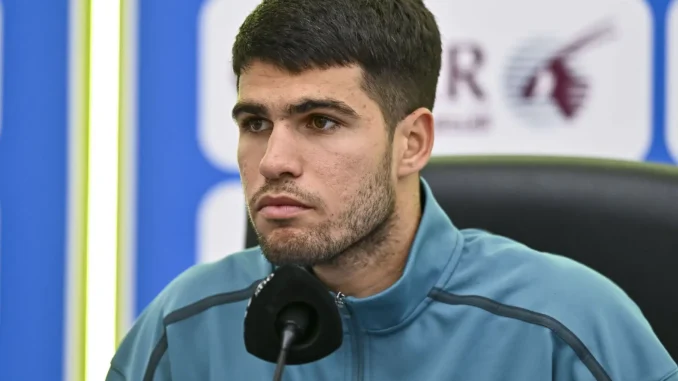
In the relentless, high-stakes universe of professional tennis, where every match is a test of skill and spirit, Carlos Alcaraz, the Spanish sensation and world No. 3, has peeled back the curtain on the mental battles that shadow his glittering career. At just 21, Alcaraz has already etched his name among the sport’s elite, boasting four Grand Slam titles and a reputation as one of the most electrifying talents of his generation. Yet, as the 2025 season unfolds, a noticeable dip in form has cast a spotlight on the psychological pressures that even a prodigy like him cannot escape. In a candid conversation on a podcast hosted by a French filmmaker for a luxury brand, Alcaraz opened up about the invisible weight that shapes his game, offering a raw and relatable glimpse into the mind of a champion grappling with the demands of stardom.
The past few months have been a rollercoaster for Alcaraz. After a triumphant start to the year, where he clinched the Rotterdam Open in February, his trajectory took a sharp turn. A string of unexpected losses—first to Jack Draper in the Indian Wells semi-finals, then a shock defeat to David Goffin in his Miami Open opener—has left fans and analysts buzzing. These setbacks, stark against the backdrop of his earlier dominance, have fueled speculation about what’s holding him back. Is it the physical toll of a grueling tour, or something deeper? Alcaraz himself points to the latter. “Psychological,” he declared when asked about the nature of pressure in tennis, his voice steady yet revealing. “It is mental. When you feel relaxed, you’re not putting yourself in that position. It is okay. Physically, it is the match. But if you can stay mental, you know, in peace and relaxed, it’s the best thing.”
This admission comes at a pivotal moment. With the clay season looming—where Alcaraz has historically thrived, including two French Open titles—the stakes are higher than ever. Last summer, he dazzled the world by defending his Wimbledon crown and adding Roland Garros to his haul, amassing 4,000 ranking points that now prop up his No. 3 spot. But those victories feel distant as he struggles to recapture that magic. His recent performances have been erratic, marked by flashes of brilliance overshadowed by uncharacteristic lapses—sloppy errors, a faltering focus, and a vulnerability that opponents have begun to exploit. “I was more worried about his level than my own,” he confessed after the Draper loss, a rare moment of self-reflection that hinted at a mind tangled in doubt rather than locked on the task at hand.
Alcaraz’s journey is a testament to the paradox of youth and greatness. At an age when most are still finding their footing, he’s already scaled peaks that took others decades to reach. His aggressive baseline play, lightning-fast reflexes, and fearless shot-making have drawn comparisons to the legends he grew up idolizing. Yet, that same precocity brings a burden few can fathom. “Since he arrived on the tour, people have said it’s extraordinary what he offers us,” a former world No. 1 observed, capturing the hype that’s trailed Alcaraz since his teens. “He hears it all, and it puts enormous pressure on his shoulders.” That pressure, once a fuel for his ascent, now seems to weigh heavier, testing his ability to stay grounded amid sky-high expectations.
What sets Alcaraz apart, though, is his willingness to confront these challenges head-on. He’s not one to hide behind bravado or deflect with clichés. Instead, he’s leaned into the mental game, working closely with his team—led by coach Juan Carlos Ferrero, a former No. 1 himself—to navigate the turbulence. “It’s great to have him,” Alcaraz said of Ferrero, who’s been by his side for six years. “He knows me well and knows how to get the best from me.” That trust will be crucial as he heads to the Monte Carlo Masters, the first stop on his clay campaign, where he’ll look to shake off the rust and silence the doubters.
The tennis world watches with bated breath. For every fan marveling at his resilience, there’s another questioning if this dip signals a deeper slump. Alcaraz, however, remains defiant. “I always say I have to be focused on myself, on my own game,” he reiterated, a mantra he’s trying to reclaim. Whether he can harness that mental peace he spoke of—turning pressure into power—will define his next chapter. As the clay courts beckon, the young Spaniard stands at a crossroads, his racket a tool not just for winning matches, but for mastering the mind that could make him one of the all-time greats.
Leave a Reply